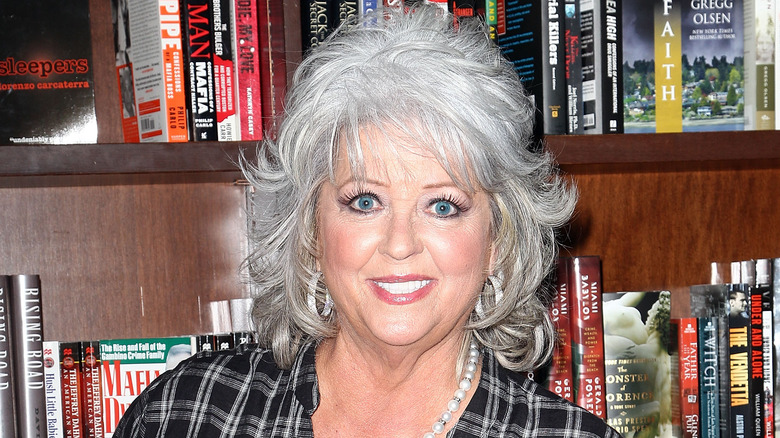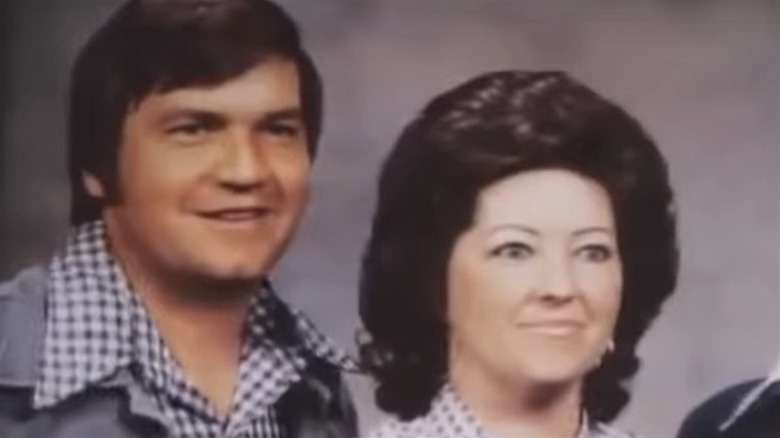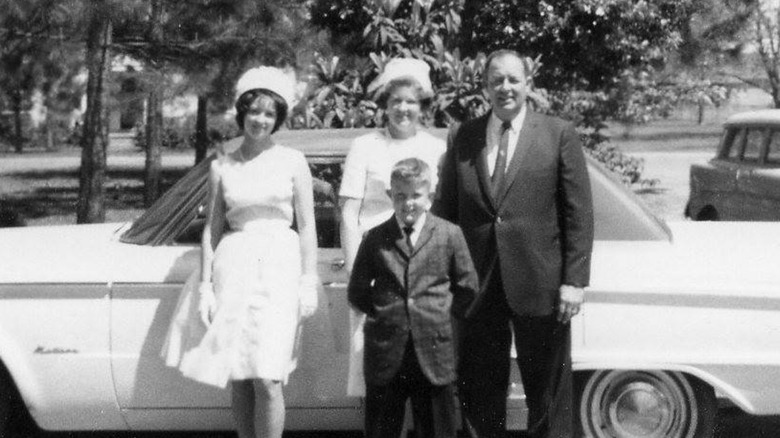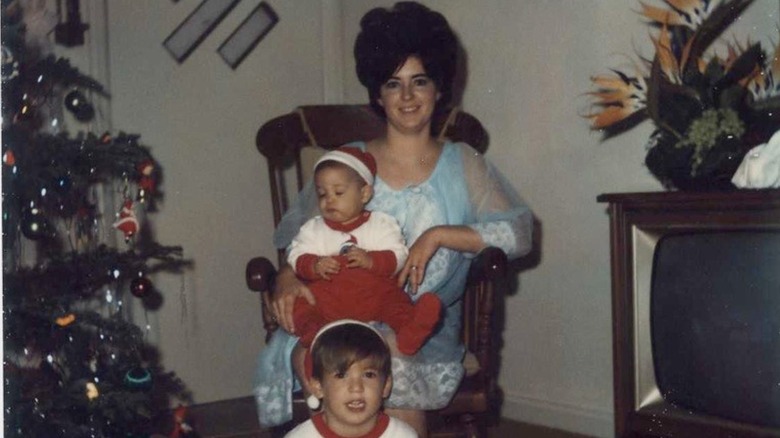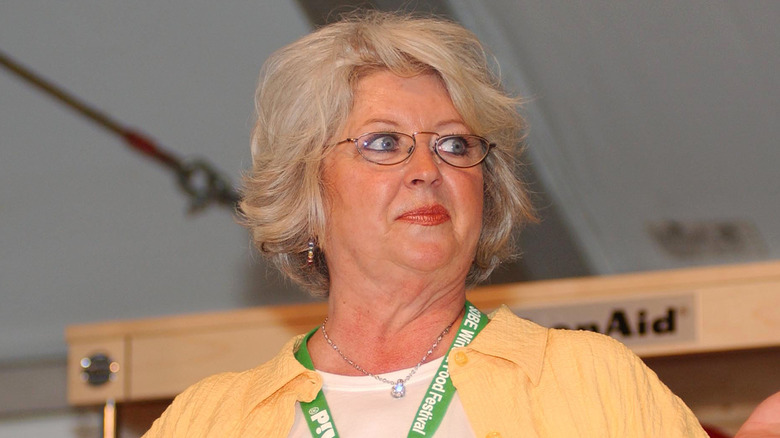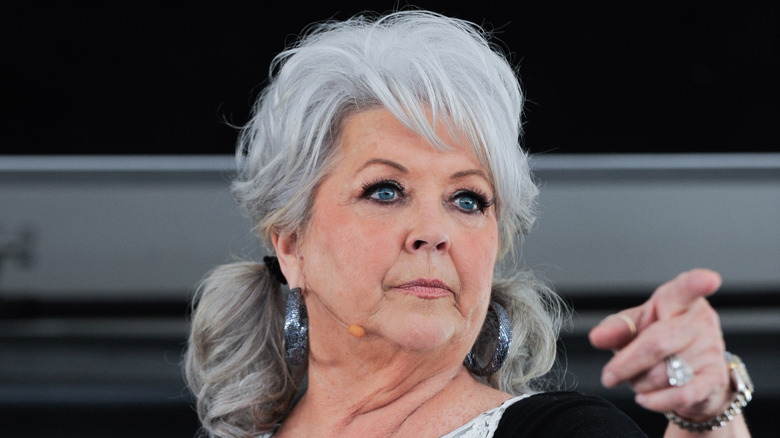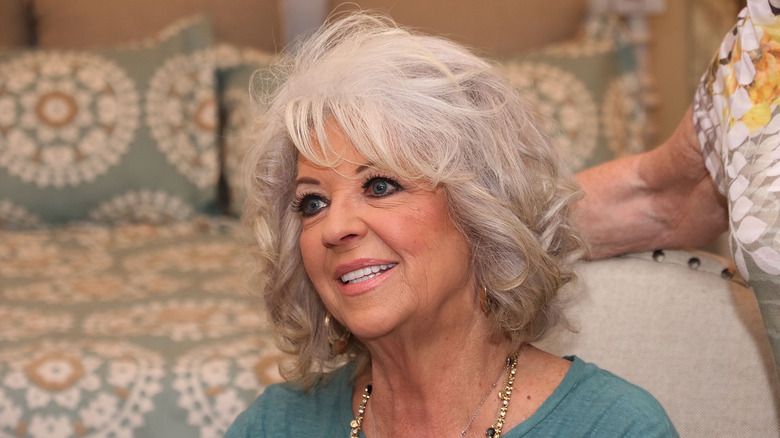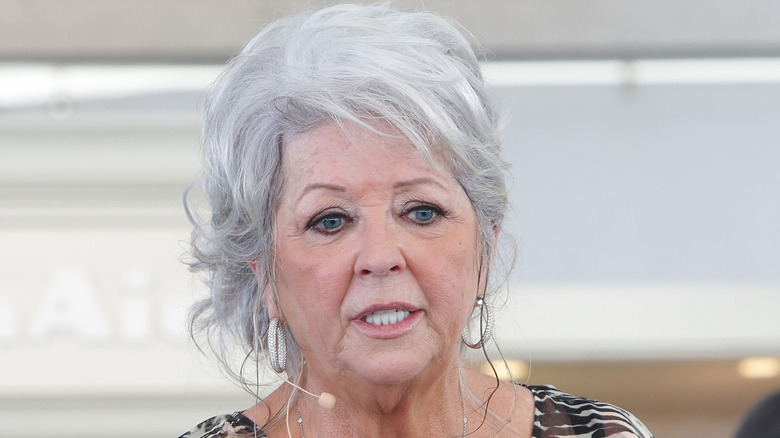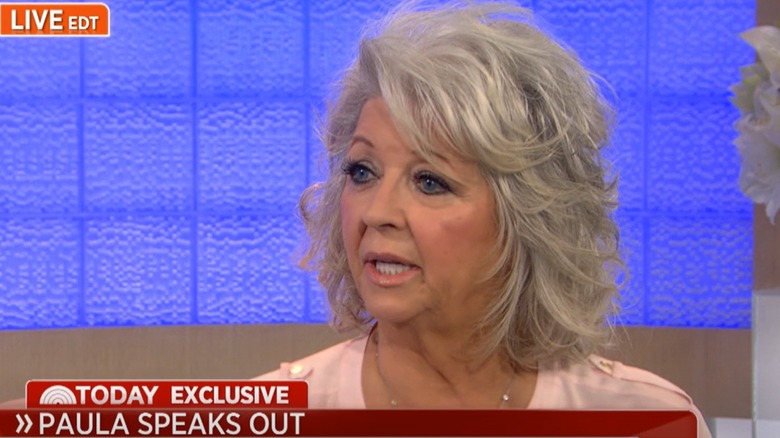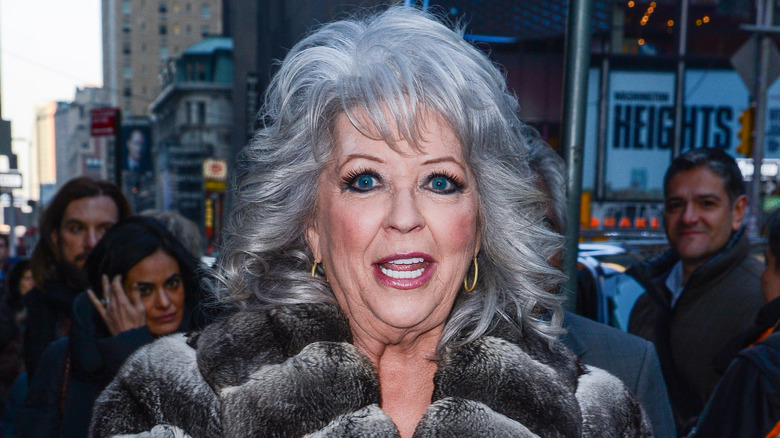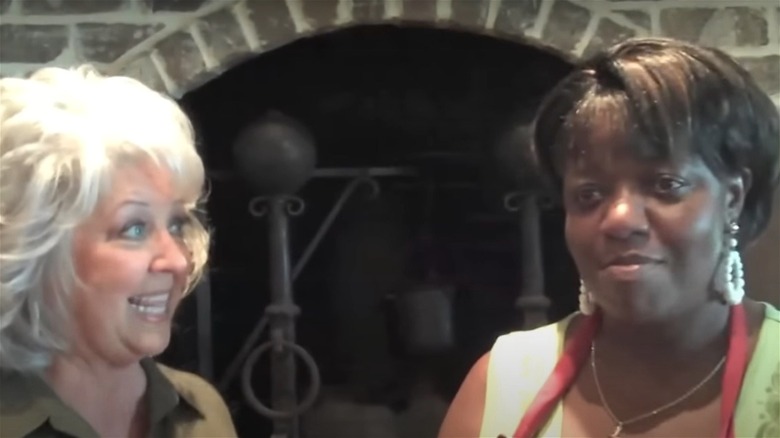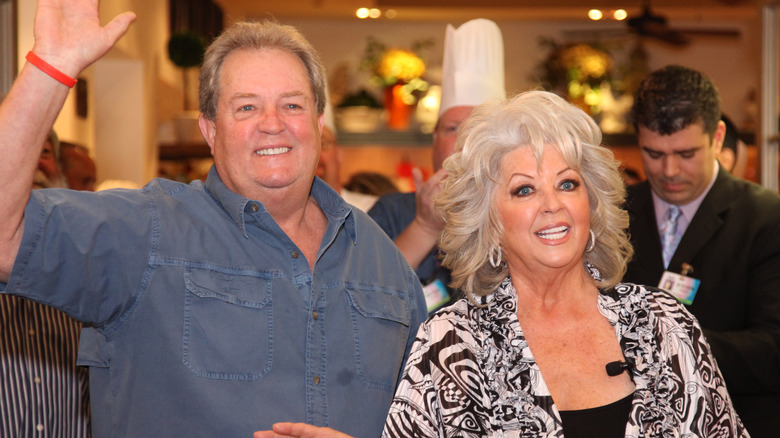Tragic Details About Paula Deen
In William Shakespeare's tragedies, protagonists like Macbeth and Hamlet suffer from a "tragic flaw" in their characters that ultimately brings about their own downfalls. We can only guess what the Bard of Avon would have thought about celebrity chef Paula Deen, who blew up a stellar career with controversies of her own making, and then shattered any attempts at redemption with a ham-handed attempt at damage control that took a bad situation and made it infinitely worse.
Before her scandal, Deen's oft-told origin story had been one of inspiration. As a middle-aged divorcée, she leaned into her talent for cooking sumptuous Southern dishes by opening a catering company she dubbed The Bag Lady, selling bagged lunches in Savannah, Georgia. That business eventually evolved into a successful restaurant, ultimately leading her to the Food Network. Viewers enjoyed watching her oversized personality and lard-laden recipes, and her TV series, "Paula's Home Cooking," became a huge hit. Ever the entrepreneur, Deen built on that success, branching out to become a media mogul in her own right as she built her brand into an empire — one stick of butter at a time.
Post-controversy, Deen has gone viral for her shocking new look, with her apparent weight loss raising concerned questions about the state of her health. To find out more, read on to learn about some of the tragic details of Paula Deen's life.
Paula Deen's 'broken' first marriage ended in a bitter divorce
Born Paula Ann Hiers, Paula Deen married her first husband, James "Jimmy" Deen, in 1965, when she was just 18 years old. She soon became the mother of two sons, Jamie and Bobby. Her married life, however, was far from idyllic, due to her husband's alcohol consumption. "The drinking changed him," Deen wrote in her memoir, "Paula Deen: It Ain't All About the Cookin'." "When he drank, he became dumb as a rock and I couldn't depend on him." His drinking drove a wedge between them, and between the verbal put-downs he hurled at her, their rift grew increasingly larger as the years passed.
After nearly 30 years of marriage, they separated in 1992 and subsequently divorced. According to court documents obtained by RadarOnline, the marriage had become "irretrievably broken" by the time they finally split up. In addition, Deen's divorce filing starkly stated that there was "no chance of reconciliation" for the fractured couple.
The final straw came when she discovered that Jimmy hadn't been making the payments on son Bobby's truck. "It had been 27 years, and now he was dragging us all down," she wrote, recalling the moment she decided she had enough and wanted out. There was, however, one final indignity she was forced to endure before ending the marriage. "But even when I filed for divorce, he never left the house," Deen added. "I was the one who had to leave."
Her parents' deaths left her shattered
Paula Deen was only 19 years old when she received news that was as tragic as it was unexpected: her father had been seriously injured in a horrific car wreck, and died two days later. He previously had a risky surgery to fix a heart problem, but sadly developed a fatal blood clot that caused him to crash his car. "I would no longer have the living love of my father," she wrote in her memoir. She was beyond crushed to lose her father, who was just 40. "I simply tore apart," she wrote. "How would I ever live with this devastation, how would I ever fill the hole in my heart that Daddy's death dug?"
Just four years later, Deen was forced to experience another family trauma when her mother was diagnosed with bone cancer; she too died young, at the age of 44. "When my mama passed away, I was devastated," she wrote on her website. "Losing your mama young is always difficult, especially when you have such a close, special relationship."
Interviewed by Fox News, Deen was convinced that it was the loss of her father that was really to blame for her mother's death. "But I say my mother died from heartbreak," Deen said, sharing her belief that the cancer that took her life was a physical manifestation of her grief. "She was a very quiet reserved lady and I said her pain had to come out somewhere because the cancer that she died from is not genetic," she explained.
Her anxiety led to agoraphobia
Losing both of her parents within a few years of each other left Paula Deen so emotionally ravaged that her mental health began to deteriorate. She was so distraught by her father's death that the only way she could fall asleep was if she lay in between her husband and her mother. "It started that day," she explained during an appearance on "Oprah's Next Chapter." "I just didn't know it."
As Deen told Entertainment Tonight, she developed a crippling terror of death that manifested itself in fear of leaving her house, transforming her life into an anxiety-ridden, prison-like existence. "I was a basket case, I became so frightened of death," she said. "I would have panic attacks and my arms would go numb and you feel like you're having a heart attack," she added, revealing that she kept a brown paper bag handy in case she needed to breathe into it to calm herself down. "It was pure unadulterated hell," she told Oprah Winfrey and Gayle King during her interview.
She didn't come to understand she was agoraphobic until the day she saw TV host Phil Donahue discussing the disorder in an episode of his talk show. "Finally, it had a name," she wrote in her memoir. She was then able to take the first steps toward conquering her fears and overcoming agoraphobia.
She was diagnosed with diabetes, then criticized for keeping it a secret
While there's no debating that Paula Deen's Southern-inspired cuisine is mouth-wateringly delicious, it's also loaded with unhealthy fat; HuffPost, in fact, added up all the butter used to make a Deen-style Thanksgiving dinner and revealed her meal required more than nine sticks of the stuff. That's why there were mixed reactions amongst the public when she announced she was diagnosed with type 2 diabetes – and transformed that particular lemon into lemonade by becoming a spokesperson for Novo Nordisk, the manufacturer of a diabetes drug.
When Deen confirmed she had been diagnosed a few years earlier, she was widely criticized for continuing to whip up her fatty fare on the Food Network, knowing the health risks involved. The most vocal of those critics was late celebrity chef Anthony Bourdain. "I would think twice before telling an already obese nation that it's okay to eat food that is killing us," Bourdain told TV Guide (via The Hollywood Reporter), lambasting Deen as the "most dangerous person in America."
Deen explained why she hadn't gone public sooner than she did. "I made the choice at the time to keep it close to me, to keep it close to my chest," she said in an interview with USA Today (via ABC News). "I felt like I had nothing to offer anybody other than the announcement. I wasn't armed with enough knowledge. I knew when it was time, it would be in God's time."
An employee sued her, making some shocking allegations
By 2012, Paula Deen had parlayed her Food Network fame into an empire that raked in $17 million that year alone. That same year, she was hit with a lawsuit from Lisa Jackson, who worked at a restaurant co-owned by Deen and her brother, Bubba Hiers.
Jackson, the restaurant's former general manager, claimed she was subjected to continual sexism and racism, alleging Hiers openly watched adult videos in the workplace, and that both siblings repeatedly used the N-word. Deen fired back by alleging that Jackson had attempted to extort her for more than $1 million. Deen eventually reached a settlement with her former employee the following year, and the suit was dismissed.
Weeks after the lawsuit was filed, however, all hell broke loose when the National Enquirer obtained Deen's deposition for the case — which was recorded on video. Asked to confirm Jackson's claim that she had used the N-word, Deen offered a startling confession. "Yes, of course," she stated (via Eater). She described that she used the word after a Black man pulled a gun on her when she worked as a bank teller. Asked if she had used the word since then, she said, "I'm sure I have, but it's been a very long time." A source claimed to the National Enquirer, "The personal disclosures uncovered have stunned Paula's family and could mark the collapse of her entire empire." It turns out that summation wasn't too far off.
She was pilloried for planning a plantation-themed wedding
"https://www.eater.com/2013/6/20/6417349/heres-the-racist-paula-deen-deposition-transcript">Paula Deen's use of the N-word wasn't the only example of jaw-dropping racism to emerge from the lawsuit and her deposition for it. Deen was hit with backlash over another section of the suit, reported "https://radaronline.com/exclusives/2012/03/paula-deen-lawsuit-lisa-jackson-bubba-hiers-barack-obama-uncle-seafood-oyster/">RadarOnline, with former employee Lisa Jackson recalling the time that Deen brainstormed ideas for a plantation-style reception she was throwing for the wedding of her brother, Bubba Hiers. "Well what I would really like is a bunch of little n******s to wear long-sleeve white shirts, black shorts and black bow ties," Deen said, according to Jackson's account. "You know in the Shirley Temple days, they used to tap dance around ... But we can't do that because the media would be on me about that."
In her deposition, Deen disputed Jackson's recollection that she desired to celebrate her brother's nuptials by emulating a pre-Emancipation Proclamation Southern plantation. She did, however, admit to using the phrase "really southern plantation wedding" when pitching her idea. Her intent, she explained, was to imitate a restaurant she had recently visited, where all the waitstaff were older Black men attired in white evening jackets. As she said, "that restaurant represented a certain era in America," one that she wanted to recreate. Asked to define the precise era to which she was referring, she replied, "Well, I don't know. After the Civil War, during the Civil War, before the Civil War."
Her admission to using racist language and lackluster apology made it all worse
Paula Deen's admission instantly transformed her from beloved TV personality to toxic pariah. Shortly after the National Enquirer's report, the Food Network cancelled her show and cut all ties with her. Deen's company issued a statement to TMZ.
"[Deen] was born 60 years ago when America's South had schools that were segregated, different bathrooms, different restaurants and Americans rode in different parts of the bus," read the tone-deaf statement, which was ripped to shreds for attempting to excuse her behavior because she was a white person from the South of a certain age. "Paula Deen's Apology for Using the N-Word Is Ridiculous," declared the Daily Beast's headline.
Deen quickly booked an appearance on the "Today" show to do some damage control, but backed out at the last minute. Instead, she issued a video on YouTube, literally begging forgiveness. "Please forgive me for the mistakes that I made," she said, with Slate jokingly comparing her stilted demeanor to that of a prisoner in a "hostage video." She posted another video, blaming the media for characterizing her as a racist. "I want people to understand that my family and I are not the kind of people that the press is wanting to say we are," she declared. After more apologies and further pleas for forgiveness, she concluded by declaring, "I will continue to work and continue to do good things for good people."
Her heavily hyped interview was pivotal in her tragic downfall
When her statement and two apology videos fell flat in the court of public opinion, Paula Deen re-examined the offer to appear on "Today." That led her to sit down on live television with soon-to-be-disgraced anchor Matt Lauer, who would eventually find himself neck-deep in an even bigger scandal than Deen's.
Once again, Deen's attempt at redemption imploded when she attempted to paint herself as the victim. "There's been some very, very hurtful lies said about me," she said. Lauer asked point-blank if she was racist. "No," she replied. "I believe that ... every one of God's creatures was created equal," she added. She insisted the only time she had ever used the N-word was that time she had a gun held to her head as a bank teller, and bizarrely criticized young Black people for their casual use of the word. Then, she contradicted what she said in her sworn deposition when she claimed that 1986 incident was the sole occasion "in all of my 66 years on Earth had I ever used it."
Ultimately, Deen's interview did nothing to move the needle. Commenting on the sit-down, "Today" anchor Savannah Guthrie offered a pretty fair assessment when she stated, "People probably went in with an opinion, and left the interview with the same opinion."
Her business empire crumbled under the weight of her controversy
Paula Deen's multiple attempts to mitigate the damage from her racism scandal had little impact. While the Food Network may have been the first corporate entity to sever ties with her, it was by no means the last. Within a matter of days, all the myriad of deals that Deen had spent a decade putting together vanished like a sand castle washed away by the high tide.
Companies to axe Deen included Walmart, Smithfield Foods, Caesars Entertainment and Target, the last of which issued a statement to announce the chain's retail outlets would no longer be carrying her branded merchandise. "We have made a decision to phase out the Paula Deen merchandise in our stores as well as on Target.com," read a statement to CNBC on X, formerly known as Twitter. Meanwhile, her lucrative partnership with the QVC home-shopping channel also went bust. "We too are troubled by what Paula has acknowledged saying. We're also troubled by the allegations against her," QVC CEO Mike George wrote in a statement. Even pharmaceutical firm Novo Nordisk fired her from her spokesperson gig, while Random House cancelled an upcoming book it was slated to publish.
As Forbes' wealth reporter Caleb Melby told ABC News, the die had been cast when Food Network pulled the plug. "To see somebody who has been so closely aligned to her — they both grew famous and wealthy together — drop her, has created a domino effect," he said.
Her right hand woman cut ties, sharing her own claims of Deen's racism
"https://www.nytimes.com/2013/07/25/us/paula-deens-soul-sister-portrays-an-unequal-bond.html?pagewanted=all&_r=0">Paula Deen was still reeling from her scandal when someone close to her emerged with further allegations. That someone was Dora Charles, who worked with Deen at her restaurants for two decades, regarded as Deen's secret weapon when it came to Southern cuisine. Charles had helped Deen open her flagship Savannah restaurant, Lady & Sons, and assisted in developing the eatery's recipes.
Deen's battered reputation took further hits when Charles gave a scorched-earth interview with "https://www.nytimes.com/2013/07/25/us/paula-deens-soul-sister-portrays-an-unequal-bond.html?pagewanted=all&_r=0">The New York Times in 2013. Accusing Deen of using racist language, she revealed that Deen had once asked her to ring a bell outside the restaurant and yell for diners to "come and get it." Charles refused. "I said, 'I'm not ringing no bell.' That's a symbol to me of what we used to do back in the day," she explained to the Times. As if that wasn't enough of a blow, Charles also recalled when Deen asked another Black employee, Ineata "Jellyroll" Jones, to dress up like Aunt Jemima for a pancake-making demonstration. "Jellyroll didn't want to hear that," Charles recalled.
Charles also recounted the promise Deen made to her early on: "Stick with me, Dora, and I promise you one day if I get rich you'll get rich." Deen did indeed get rich, very rich; Charles still earned $6.50 an hour. Deen responded with a statement characterizing Charles as greedy, stating, "Fundamentally Dora's complaint is not about race but about money."
She was blindsided by the death of her brother
Paula Deen's brother, Bubba Hiers, had been involved in many of the allegations brought forth in the lawsuit that destroyed her career and her reputation. Hiers had begun working with his sister in 2000, and was an integral part of developing and building her successful restaurant endeavors. "I dreamed that someday my boys and I would find a way to drag Bubba into the business with us," Deen gushed when writing the foreword to her brother's cookbook, "Uncle Bubba's Savannah Seafood" (via the Daily Mail), named for his namesake restaurant, Uncle Bubba's Oyster House. "Without Paula's support, sensible advice, and unconditional love, I'd probably be a lost soul," he wrote in his cookbook's introduction.
In 2019, Hiers passed away from pancreatic cancer at the age of 65. Just a few years earlier, in 2014, Uncle Bubba's Oyster House was forced to shut its doors, its business fatally eroded by the racism scandal unleashed by that lawsuit. Polly Powers Stramm, who co-wrote Hiers's recipe book, told the Daily Mail that he "kind of dropped off the map" after the restaurant closed.
"Bubba was the greatest brother who was loved by so many people," Deen said in a statement to USA Today. "We will miss him dearly."

